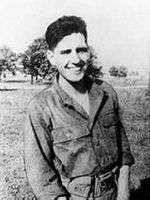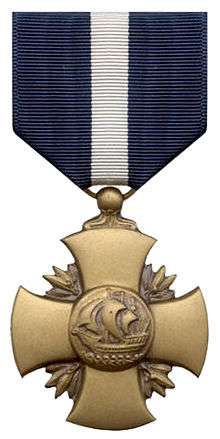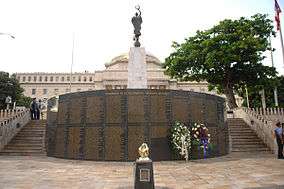Ramón Núñez-Juárez
Private First Class Ramón Núñez-Juárez[note 1] (May 25, 1931 – August 9, 1952) was a United States Marine who was posthumously awarded the Navy Cross, second highest military award of the United States of America after the Medal of Honor. He was the only Puerto Rican member of the United States Marine Corps whose remains have never been recovered and who was listed as Missing in Action during the Korean War.[1]
Ramón Núñez-Juárez | |
|---|---|
 PFC Ramón Núñez-Juárez | |
| Born | May 25, 1931 San Sebastián, Puerto Rico |
| Died | August 9, 1952 (aged 21) KIA in Korea |
| Place of burial | |
| Allegiance | |
| Service/ | |
| Years of service | 1951–1952 |
| Rank | |
| Unit | Company E, 2nd Battalion, 1st Marines |
| Battles/wars | |
| Awards | Navy Cross Purple Heart |
Early years
Núñez-Juárez was born in San Sebastián, Puerto Rico, where he received his primary and secondary education. In 1952, Núñez-Juárez was inducted into the Marines in San Juan, the island's capital, and reported to Marine Corps Recruit Depot Parris Island, South Carolina. After he graduated from his basic training, he was sent to Camp Lejeune in North Carolina where he underwent advanced training before being sent to Korea. He was assigned as an automatic rifleman to Company E of the 2nd Battalion, 1st Marines (2/1), 1st Marine Division.[1]
Korean War
The 1st Marine Division was stationed in the eastern part of Korea when in early spring of 1952 it was ordered to move to defend the western sector. The sector, which was 15 miles (24 km) long and stretched all the way to the Samichon River, was a section of the 8th Army's Main Line of Resistance (MLR) known as the Jamestown Line.[2]
On August 8, 1952, E Company, 2/1, began taking incoming mortar and artillery rounds from the Communist Chinese Army's 63rd and 65th armies. A company-size Chinese Communist Force (CCF) struck Outpost Siberia, which was manned by PFC Ramón Núñez-Juárez and a squad of 15 men. Núñez-Juárez and the other the riflemen fought off the enemy for nearly half an hour before withdrawing from their position.[1]
Núñez-Juárez, manning a Browning Automatic Rifle (BAR), was able to halt the enemy's advance long enough for the remainder of his squad to escape. Núñez-Juárez was struck by enemy gunfire and died as a result of his wounds. For the next several days the Marines tried to retake Outpost Siberia, but were unable to do so. Núñez-Juárez was listed as Missing in Action and was posthumously awarded the Navy Cross for his heroic actions.[2]
Navy Cross citation

The Navy Cross is presented to Ramon Nunez-Juarez (1240152), Private First Class, U.S. Marine Corps, for extraordinary heroism in connection with military operations against an armed enemy of the United Nations while serving as an Automatic Rifleman of Company E, Second Battalion, First Marines, First Marine Division (Reinforced), in action against enemy aggressor forces in the Republic of Korea on August 9, 1952. With his squad's position on a vitally important hill encircled and attacked from three sides by a numerically superior enemy force following an intense hostile artillery and mortar barrage, Private First Class Nunez- Juarez fearlessly remained in his forward position and delivered effective rifle fire which greatly aided in halting the attackers. When his supply of ammunition was expended, he unhesitatingly left his fighting position and crawled down the slope to acquire a re-supply from one of his comrades. Unable to return to his original position, he quickly set up his weapon at an alternate point near the crest of the hill and continued to deliver devastating fire upon the enemy. Aware that his squad was unable to evacuate its casualties without covering fire, he gallantly held his commanding ground when the order to withdraw was given and poured accurate fire on the hostile force to enable his unit to withdraw to a safe position. By his indomitable fighting spirit, courageous initiative and resolute determination in the face of overwhelming odds, Private First Class Nunez-Juarez served to inspire all who observed him and contributed in large measure to the successful withdrawal of his entire squad. His great personal valor reflects the highest credit upon himself and enhances the finest traditions of the United States Naval Service.Authority: Board Serial 1022 (December 1, 1953)
Born: 5/25/1931 at San Sebastian, Puerto Rico
Postscript
PFC Ramón Núñez-Juárez's remains have never been recovered and a symbolic burial with full military honors was held on October 25, 1970. There is a headstone with his name inscribed above an empty grave in the Puerto Rico National Cemetery, located in Bayamon, Puerto Rico. His name is inscribed in El Monumento de la Recordación, a monument dedicated to the Puerto Ricans who have fallen in combat, located in San Juan, Puerto Rico.[4][5]
Awards and decorations

Among Ramón Núñez-Juárez's awards and decorations are the following:
| Navy Cross | Purple Heart | Combat Action Ribbon |
| Navy Unit Commendation | National Defense Service Medal | Korean Service Medal with two bronze service stars |
| Presidential Unit Citation (Korea) | United Nations Korea Medal | Korean War Service Medal |
See also
- List of Puerto Ricans
- List of Puerto Rican military personnel
- Puerto Ricans Missing in Action - Korean War
- Puerto Rican recipients of the Navy Cross
- Hispanics in the United States Marine Corps
- List of Navy Cross recipients for the Korean War
Notes
- This article uses Spanish naming customs: the first or paternal family name is Núñez and the second or maternal family name is Juárez.
References
- THE OUTPOST WAR: US Marines in Korea Vol. 1 1952, By Lee Ballenger, Published 2000 Brassey's, Page 107, ISBN 1-57488-373-9
- Hemingway, " 'King' of the Hill", 2002.
- Ramon Nunez-Juarez Navy Cross citation Archived 2007-09-29 at the Wayback Machine, Home of Heroes.
- Puerto Rico National Cemetery
- Monumento de la Recordacion Archived 2007-03-03 at the Wayback Machine
Further reading
- "Puertorriquenos Who Served With Guts, Glory, and Honor. Fighting to Defend a Nation Not Completely Their Own"; by : Greg Boudonck; ISBN 1497421837; ISBN 978-1497421837
External links
- Hemingway, Al (August 2002). "'King' of the Hill". VFW Magazine.
- "Marine Corps Navy Cross citations — Korean War". HomeofHeroes.com. Archived from the original on 2007-09-29.
- "Puerto Rico National Cemetery, Bayamón, Puerto Rico". Cemetery Transcription Library.